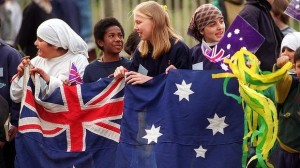Survey finds multiculturalism means different things to different people
 Multiculturalism faces an uncertain future with a large section of Australia’s population fearing or rejecting social change, according to new research commissioned by SBS.
Multiculturalism faces an uncertain future with a large section of Australia’s population fearing or rejecting social change, according to new research commissioned by SBS.
Evidence from the latest Census shows us that over recent decades Australians are ageing, they are more culturally diverse, they live in smaller family units, they are more secular and they are consuming more resources.
But the SBS survey reveals a ‘reactionary’ rump of about 47 per cent of Australians who reject social change and want to keep current social mores and retain the ethnic make-up of the nation.
The research identified another group of around 30 per cent of the population who are more open-minded about the future and change – but are protective of their own lifestyles and interests.
Only a ‘cosmopolitan’ minority of about 5 per cent was drawn towards new opportunities and welcoming of a changing world.
The survey asked a thousand Australians whether they believe the national identity has changed in the past 20 years, and what Australia might look like in the next two decades.
Of those surveyed, Australians of non-Anglo-Celtic backgrounds were far more likely to agree that Australia is much less racist than it used to be, while Anglos-Celts think we have stayed much the same.
Non-Anglos see less materialism in Australia than Anglo-Australians. They are more trusting of immigrants, while being more fearful of the expansion of racism in the future.
Overwhelmingly, those surveyed agree that the main changes that have happened are those that have made us more multicultural and more materialistic.
More than half of those surveyed believed that 20 years ago, Australians were easygoing, friendly and outgoing, trustworthy, unpretentious and “tough”. Today, less than half believe that these descriptions are accurate.
Australians do see themselves as more social – moving away from a concentration on family; we see ourselves as slightly more open-minded, intelligent and creative, although more materialistic, the survey reveals.
We still see ourselves as racist and discriminatory, and a bit less sexist – though much more ageist – than we once were, it shows.
The survey shows that ‘mateship’ seems to be in decline and that we whinge more. We are less positive and optimistic and there appears to be a large gap between ‘how Australians see themselves in the media’ and ‘how Australians really are’.
The survey suggests the next generation will continue to experience a multicultural society but there is division on what this will look like.
These divisions are underpinned by how we think we will be placed in the future economy, the report says.
While a significant number of people (37 per cent) see an improved quality of life, another group (28 per cent) thinks the future will leave them worse off.












